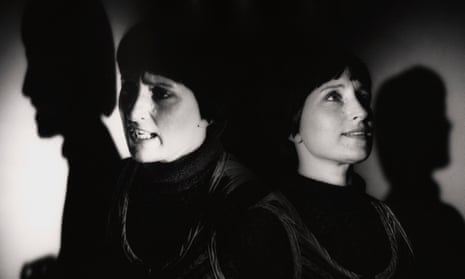Whether sky-diving through the musical stratosphere or negotiating the fearsome complexities of the latest score to be written for her, Jane Manning, who has died aged 82, was a beacon lighting up the world of contemporary classical music from the mid-1960s onwards. Giving the premieres of, by her own estimate, some 350 works, she could always be relied upon to deliver them with pinpoint accuracy of pitch and theatrical panache.
One of her best-known interpretations was of Schoenberg’s Pierrot Lunaire, which she performed more than 100 times all over the world. Her command of the composer’s sprechstimme, or speech-song, was total, capturing the rise and fall of speech patterns and touching notes without sustaining them. But she would deploy that skill to inhabit the moonstruck aura of the suffering clown with mordant wit, irony and passion.
Manning launched her professional career in London in 1964, nailing her colours to the mast with a concert of music by three modernists: Webern, Dallapiccola and Messiaen. She went on to espouse the cause of contemporary music with unflagging energy and commitment. Not content with giving premieres, she would, where she truly believed in a piece, go on to give second, third, fourth, even 50th performances. Supportive of composers and fellow singers, she was an anchor of the contemporary music community.
On the opera stage she created roles such as that of Max in Oliver Knussen’s Where the Wild Things Are (1980), gave the premiere of John Cage’s Europera III (1990), touring it throughout Europe, and of Judith Weir’s one-woman opera King Harald’s Saga (1979), encompassing eight roles in the space of 10 minutes. She also committed to disc all the major song cycles of Messiaen, all of Satie’s vocal music, and music by Berg, Dallapiccola, Ligeti and Schoenberg. Pierrot Lunaire she recorded three times: with the Vesuvius Ensemble (1967), the Elsinore Players (1983) and in a benchmark recording with the Nash Ensemble under Simon Rattle (1984).
With her husband, the composer Anthony Payne, whom she married in 1966, she set up in 1988 a new music ensemble, Jane’s Minstrels, among whose founder members were Roger Montgomery (horn and conductor), Fenella Barton (violin), Dov Goldberg (clarinet), Dominic Saunders (piano) and Richard Benjafield (percussion). Not confining themselves to contemporary music, the ensemble also performed fantasias by Purcell and chamber works by Elgar, Bridge and Grainger, among others.
However, 20th-century scores formed the backbone of the ensemble’s repertoire, with Pierrot Lunaire a particular favourite, as well as other scores influenced by it, ranging from Walton’s Façade to Peter Maxwell Davies’s Miss Donnithorne’s Maggot, in which Manning’s “vocal tightrope-walking” was commended. Jane’s Minstrels also premiered and recorded the works of numerous composers, including Weir, Payne, Elisabeth Lutyens, Brian Elias, James MacMillan, Colin Matthews and Matthew King.
Born in Norwich, the daughter of Gerald Manning and his wife, Lily (nee Thompson), she attended Norwich high school. After leaving the Royal Academy of Music, London, in 1958, she studied in Switzerland and returned to London to study with Frederick Jackson and Yvonne Rodd-Marling.
She gave a BBC broadcast of Pierrot Lunaire in 1965, and her first BBC recital, of songs by Peter Warlock, the following year, going on to broadcast frequently in a range of repertoire from traditional to light music, as well as contemporary. She also sang Bach and Handel before the historical performance movement got under way. Her opera appearances included the title role in Lully’s Armide with the Western Australian Opera Company, Fiordiligi in Così Fan Tutte, Anna I in Weill’s Seven Deadly Sins and an acclaimed Governess in Britten’s Turn of the Screw (Wexford, 1976), projecting the character as dutiful and straitlaced to the point of neurotic repression.
Despite favourable reviews, however, these openings proved a cul-de-sac, somewhat to her regret. In any case it is for her energetic promotion of contemporary music that she will be remembered, whether it be her supremely accomplished Pierrot or in lesser known works such as Alison Bauld’s Farewell Already, an alternately pitiful and venomous lament, or – in a related vein – Lutyens’ Lament of Isis on the Death of Osiris (extracted for Manning by the composer from her lyric drama Isis and Osiris), where her voice soars and keens in grief. Her trademark agility and articulation enabled her to invest these none-too-accessible scores with the force of her own ebullient personality.
In her various anniversary concerts she characteristically seized the opportunity to support contemporary composers. Her 65th birthday, in 2003, for example, was celebrated in conjunction with the 15th anniversary of Jane’s Minstrels, with music by Weir, Payne, King, Thea Musgrave and Roberto Gerhard, with Pierrot Lunaire as a breathtaking climax. In 2012 she marked 45 years of performing by commissioning new pieces by MacMillan, Matthews, Dai Fujikura, Deirdre Gribbin, Cheryl Frances Hoad, Phillip Neil Martin and David Sawer.
In 2013 she celebrated her 75th birthday by “sight-reading” and commenting on a number of new works submitted by young composers, some unaccompanied, some with piano, delivering them with undimmed trenchancy and flawless pitching.
In 1990 she was appointed OBE, and her advocacy of contemporary music also saw her serving for a number of years as a vice-president of the Society for the Promotion of New Music. She travelled the world as a voice teacher and compiled invaluable surveys: two volumes of New Vocal Repertory (1986, 1988) and two further volumes of Vocal Repertoire for the Twenty-First Century (2020), in which she supplied fascinating insights into such matters as tessitura, vocal colour, voice types, text interpretation and technique.
She and Payne, who survives her, remained keen observers and supporters of the contemporary music scene, regularly attending events mounted by the younger generation.

Comments (…)
Sign in or create your Guardian account to join the discussion